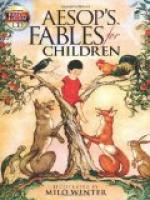|
This section contains 2,583 words (approx. 9 pages at 300 words per page) |

|
SOURCE: Pat Pflieger, "Fables into Picture Books," in Children's Literature Association Quarterly, Vol. 9, No. 2, Summer, 1984, pp. 73-80.
In the following essay, Pflieger discusses the effect that the use of illustrations has on the interpretation of individual fables.
With their minimal plots, fables seem a natural choice for picture books. The author and illustrator can embellish the tale and give it a personal touch. In picture books, the main characters in fables lose their anonymity and become more individual. These books stress the entertaining qualities of the tales, though without sacrificing the lessons, which are sometimes even strengthened by the text or the illustrations.
Most of the fables presented singly in picture books are those of Aesop or La Fontaine. Eighteen of the twenty-six picture books I investigated are based on tales from Aesop or on La Fontaine's version of them, two on a story in La Fontaine that...
|
This section contains 2,583 words (approx. 9 pages at 300 words per page) |

|


